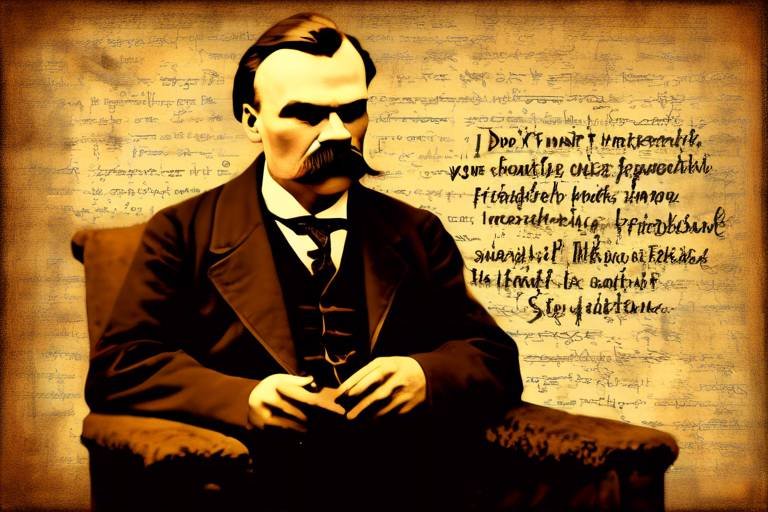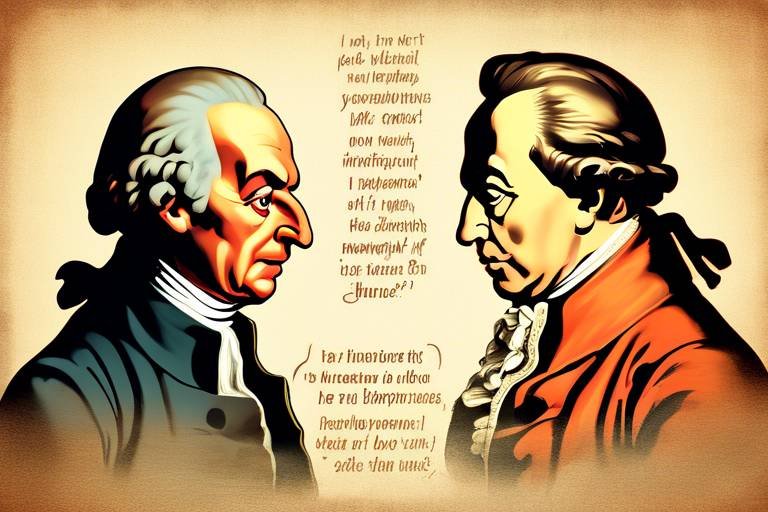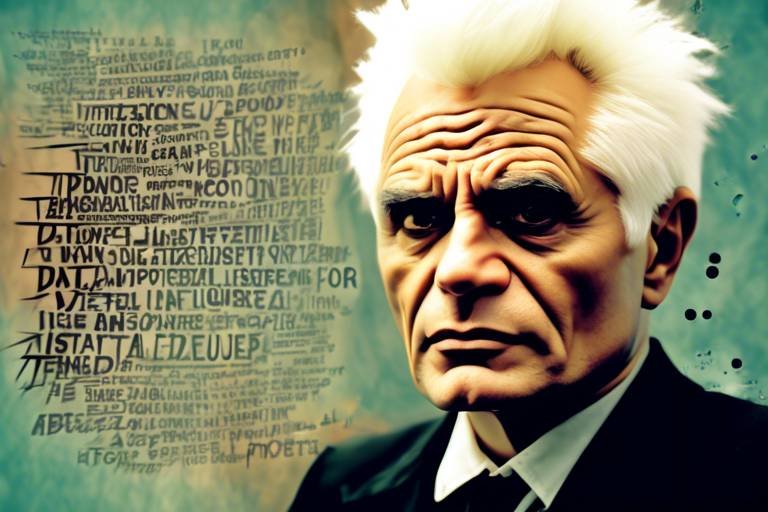Examining Friedrich Nietzsche’s Moral Relativism
Friedrich Nietzsche, a name that echoes through the corridors of philosophy, is often regarded as a revolutionary thinker who dared to challenge the very fabric of conventional morality. His exploration of moral relativism not only shakes the foundations of traditional ethical frameworks but also invites us to reconsider our own beliefs about right and wrong. So, what exactly is moral relativism, and why does it matter? In this article, we will delve into the complexities of Nietzsche's moral philosophy, examining its implications for ethics, society, and individual behavior.
At its core, Nietzsche's moral relativism posits that moral values are not universal truths but rather constructs shaped by cultural, historical, and individual contexts. This perspective starkly contrasts with the idea of absolute morality, which claims that certain actions are inherently right or wrong, regardless of circumstances. By questioning these absolutes, Nietzsche encourages a more nuanced understanding of morality that is adaptable and personal. Imagine morality as a kaleidoscope—each twist and turn reveals a different pattern, shaped by the viewer's perspective. This metaphor encapsulates Nietzsche's belief that our moral compasses are influenced by our experiences and environments.
Nietzsche's challenge to traditional morality is not merely academic; it has profound implications for how we live our lives. By recognizing that moral values can vary between cultures and individuals, we open ourselves to a world of possibilities. This does not mean that anything goes; rather, it invites a deeper exploration of what we value and why. Are we merely following societal norms, or are we actively engaging with our beliefs? Nietzsche's philosophy encourages us to take the reins of our moral journey, urging us to define our values rather than passively accepting those handed down to us.
As we navigate through Nietzsche's thoughts, we will also encounter the concept of the Übermensch, a figure that embodies the ideal of overcoming traditional moral constraints. The Übermensch represents a new vision for humanity, one that embraces individualism and creativity. In a world where moral relativism reigns, the Übermensch stands as a beacon of self-determination, challenging us to transcend societal limitations and forge our own paths.
In conclusion, Nietzsche's moral relativism compels us to question the status quo and engage with our ethical beliefs on a profound level. It serves as a reminder that morality is not a one-size-fits-all doctrine but a dynamic interplay of influences that shape our understanding of right and wrong. As we continue to explore Nietzsche's philosophy, we will uncover the layers of thought that challenge our perceptions and invite us to embrace the complexity of human morality.
- What is moral relativism?
Moral relativism is the view that moral judgments are not universally true but are instead shaped by cultural, social, or individual contexts. - How does Nietzsche's philosophy differ from traditional morality?
Nietzsche challenges the notion of absolute morality, advocating for a more flexible understanding of ethics that allows for personal interpretation and individual values. - What is the significance of the Übermensch in Nietzsche's philosophy?
The Übermensch represents an ideal individual who transcends conventional morality, embracing creativity and self-determination. - How does Nietzsche's moral relativism impact modern ethical theories?
Nietzsche's ideas have influenced contemporary discussions on morality, prompting debates about the nature of ethical truths and individual versus societal values.

The Foundations of Nietzsche’s Philosophy
Understanding the intricacies of Friedrich Nietzsche's philosophy is akin to navigating a labyrinth—filled with twists, turns, and unexpected revelations. At the heart of Nietzsche's thought lies a radical departure from traditional moral frameworks, which he believed were constraining and often hypocritical. His philosophy is not just a critique of existing moralities; it is a call to redefine what it means to be human in a world where absolutes are increasingly questioned.
One of the cornerstones of Nietzsche's philosophy is the idea that morality is not a universal truth but rather a construct shaped by cultural, historical, and individual contexts. This perspective leads us to his famous assertion that "God is dead," a provocative statement that signifies the decline of traditional religious and moral values in the modern world. With the absence of a divine moral compass, Nietzsche argues that individuals must create their own values and meanings. This is where the concept of moral relativism emerges—suggesting that what is considered right or wrong can vary dramatically from one society to another, and even from one individual to another.
Furthermore, Nietzsche's philosophy emphasizes the importance of individual experience in shaping one's ethical beliefs. Unlike the rigid moral codes imposed by society, he advocates for a more personal approach to morality, where individuals draw from their own experiences, instincts, and desires. This leads to the formation of a unique moral framework that is more authentic and reflective of one's true self. Nietzsche believed that embracing this individualism could liberate people from the shackles of herd mentality, allowing for a richer and more fulfilling existence.
To illustrate this idea, consider the following key concepts that underpin Nietzsche’s views on morality:
- Perspectivism: The notion that knowledge and truth are viewed from various perspectives, challenging the idea of an objective reality.
- Master-Slave Morality: Nietzsche distinguishes between 'master' morality, which values strength and nobility, and 'slave' morality, which arises from the resentment of the weak towards the strong.
- Self-Overcoming: The idea that individuals should strive to transcend their limitations and societal norms to achieve their true potential.
These foundational concepts not only reveal Nietzsche's disdain for conventional morality but also highlight his vision for a more dynamic ethical landscape. He believed that by rejecting absolute truths, individuals could embrace a more fluid and adaptable approach to ethics, one that encourages creativity and personal growth. In this way, Nietzsche challenges us to reconsider the very nature of morality and its role in our lives.
Ultimately, the foundations of Nietzsche’s philosophy lay the groundwork for his critique of societal norms and his advocacy for a more profound understanding of individual values. As we delve deeper into his ideas, we will uncover how they culminate in the concept of the Übermensch, a figure that embodies the pinnacle of ethical evolution and personal empowerment.
- What is Nietzsche's view on morality? Nietzsche believed that morality is a construct shaped by individual and cultural contexts rather than an absolute truth.
- What does "God is dead" mean? This phrase signifies the decline of traditional religious and moral values in modern society, prompting individuals to create their own values.
- How does Nietzsche's philosophy influence modern ethics? Nietzsche's ideas challenge conventional moral frameworks and encourage a more personal and dynamic approach to ethics.

The Concept of the Übermensch
The Übermensch, often translated as "Overman" or "Superman," stands as one of the most provocative and essential figures in Friedrich Nietzsche's philosophy. This concept embodies Nietzsche's vision of a new kind of human being who transcends the limitations of conventional morality and societal norms. To fully appreciate the significance of the Übermensch, it is crucial to understand that Nietzsche was not merely advocating for a stronger individual; rather, he was proposing a radical re-evaluation of what it means to be human in a world devoid of absolute truths.
At its core, the idea of the Übermensch challenges us to rethink our values and aspirations. Nietzsche believed that traditional moral frameworks, which often emphasize conformity and obedience, stifle human potential and creativity. The Übermensch, therefore, represents an individual who creates their own values and lives authentically, free from the constraints imposed by society. This figure is not just an ideal; it is a call to action for individuals to embrace their own uniqueness and strive for greatness.
To illustrate this concept further, consider the following characteristics that Nietzsche attributes to the Übermensch:
- Self-Overcoming: The Übermensch continually seeks personal growth and improvement, overcoming obstacles and limitations.
- Value Creation: Instead of adhering to pre-existing moral codes, the Übermensch creates their own values based on personal experience and insight.
- Affirmation of Life: This figure embraces life in all its complexities, including suffering and hardship, viewing them as essential components of existence.
- Individualism: The Übermensch prioritizes personal autonomy and self-determination over societal expectations.
Nietzsche's vision of the Übermensch serves as a powerful antidote to the mediocrity of herd mentality. He critiques the idea that morality is a universal constant, arguing instead that it is a construct shaped by cultural and historical contexts. The Übermensch, therefore, is not bound by these constructs but instead forges a path that is uniquely their own. This radical individualism is not an endorsement of selfishness; rather, it is a celebration of human potential and the capacity to innovate.
Moreover, the Übermensch is intricately linked to Nietzsche's concept of the Will to Power, which we will explore in the following section. This connection highlights how the drive for power—understood not merely as domination over others but as the ability to assert one's will and create meaning—fuels the emergence of the Übermensch. In this light, the Übermensch becomes a symbol of humanity's potential to evolve and rise above the limitations of traditional morality.
In conclusion, the concept of the Übermensch is a cornerstone of Nietzsche's philosophy, challenging individuals to transcend societal norms and embrace their unique potential. It invites us to question the very foundations of our moral beliefs and encourages a journey of self-discovery and personal empowerment. As we delve deeper into Nietzsche's thoughts, we will uncover how this idea not only reshapes our understanding of morality but also influences contemporary ethical discussions.
- What does the term Übermensch mean? The term translates to "Overman" or "Superman," representing an ideal individual who creates their own values and transcends conventional morality.
- How does the Übermensch relate to Nietzsche's views on morality? The Übermensch challenges traditional moral frameworks, advocating for individualism and the creation of personal values rather than adherence to societal norms.
- Is the Übermensch a realistic goal for individuals? While it may be an ideal, Nietzsche's concept encourages individuals to strive for personal growth and authenticity in their lives.

The Will to Power
When we dive into Friedrich Nietzsche's philosophy, one of the most striking concepts that emerges is the Will to Power. But what does this term really mean? At its core, the Will to Power is not merely about domination or control; rather, it's an intrinsic drive that compels individuals to assert and enhance their existence. Think of it as the fuel that ignites our ambitions, creativity, and desires. It’s like a river, flowing vigorously, carving its path through the landscape of our lives, shaping who we are and what we strive to become.
Nietzsche posits that this drive is fundamental to human nature and is the essence of life itself. It transcends mere survival instincts, pushing us toward a more profound engagement with the world around us. The Will to Power encourages us to create values rather than simply adhere to those handed down by society. It’s about embracing our potential and recognizing that we are the authors of our own moral narratives.
In a society where traditional morals often dictate our actions, the Will to Power serves as a liberating force. It challenges us to question the status quo and to redefine what is deemed “good” or “evil.” For Nietzsche, this is a revolutionary idea. He believed that the most profound transformations in ethics arise when individuals tap into their Will to Power, leading to the emergence of new values that reflect personal experiences and insights.
To further illustrate this point, consider the following implications of the Will to Power:
- Self-Overcoming: Nietzsche emphasizes the importance of constantly striving to surpass oneself. This self-overcoming is not just about achieving external success but involves a deep, internal transformation.
- Creativity and Innovation: The Will to Power fosters creativity. When individuals are empowered to express their true selves, they contribute to the evolution of culture and society.
- Rejection of Passive Acceptance: Nietzsche critiques those who passively accept societal norms. The Will to Power encourages active engagement and challenges individuals to forge their paths.
In essence, the Will to Power is a call to action. It invites us to embrace our individuality and to recognize that our values are not preordained but can be shaped through our experiences and choices. This idea is particularly significant in the context of moral relativism, as it underscores the notion that morality is not a fixed entity but rather a fluid construct, constantly evolving with each individual’s journey.
So, the next time you find yourself grappling with questions of right and wrong, remember Nietzsche's vision. The Will to Power is not just a philosophical concept; it’s a reminder that we hold the power to create our values and to live authentically. It’s about taking the reins of our moral compass and steering our lives toward a more vibrant, individualized existence.
- What is the Will to Power? The Will to Power is a central concept in Nietzsche's philosophy, representing an intrinsic drive to assert and enhance one's existence beyond mere survival.
- How does the Will to Power relate to morality? It challenges traditional moral frameworks, suggesting that values are not absolute but can be shaped by individual experiences and choices.
- Can the Will to Power lead to negative outcomes? While it promotes individuality and creativity, it can also lead to conflicts if misinterpreted as a justification for domination over others.

The Role of Individualism
When we dive into Friedrich Nietzsche's philosophy, we can't help but notice how individualism is a cornerstone of his thought. Nietzsche believed that each person should forge their own path, creating values that resonate with their unique experiences rather than merely adhering to societal norms. Imagine a world where everyone is a painter, and each individual paints their own masterpiece—this is the essence of Nietzsche's vision of individualism. He challenges us to break free from the chains of conformity and to embrace our personal journeys.
In Nietzsche's view, the individual is not just a cog in the societal machine but rather a powerful creator of meaning. He argued that traditional morals, often imposed by society, can stifle creativity and personal growth. By prioritizing individualism, Nietzsche encourages us to question the status quo and to explore our inherent potential. This self-exploration is not just an act of rebellion; it's a necessary step toward becoming the Übermensch, or "Overman," who transcends conventional morality.
To Nietzsche, individualism isn't merely about selfishness or self-interest; it's about authenticity. It's about stripping away the layers of societal expectations and discovering who we truly are. The journey of self-discovery can be daunting, much like navigating a dense forest without a map. Yet, it is through this journey that we can cultivate our values and beliefs, ultimately leading to a richer and more fulfilling life.
Furthermore, Nietzsche's emphasis on individualism has profound implications for society as a whole. When individuals are encouraged to express their unique perspectives, it fosters a culture of diversity and innovation. Just as a garden thrives when it contains a variety of plants, society flourishes when it embraces the richness of individual contributions. In this light, individualism becomes a catalyst for progress, challenging stagnant ideas and paving the way for new possibilities.
However, it's essential to recognize that Nietzsche's call for individualism does not advocate for isolation. Instead, it promotes a community where individuals respect one another's journeys while remaining true to themselves. It's a delicate balance, akin to a symphony where each musician plays their part, contributing to a harmonious whole. In this way, Nietzsche's individualism can lead to a more vibrant and dynamic society, where personal freedom and collective growth coexist.
In summary, Nietzsche's philosophy of individualism is a clarion call for self-exploration and authenticity. By encouraging individuals to break free from societal constraints and create their own values, he lays the groundwork for a more innovative and diverse society. Embracing individualism isn't merely an act of defiance; it's an invitation to discover our true selves and to contribute meaningfully to the world around us.
- What does Nietzsche mean by individualism?
Nietzsche's concept of individualism emphasizes the importance of personal values and self-discovery, encouraging individuals to create their own moral framework rather than conforming to societal norms. - How does individualism relate to the Übermensch?
The Übermensch represents an ideal individual who transcends conventional morality and creates their own values, embodying the principles of individualism that Nietzsche advocates. - Can individualism lead to societal progress?
Yes, by fostering a culture of diversity and innovation, individualism can challenge stagnant ideas and contribute to societal growth.

The Critique of Herd Morality
Friedrich Nietzsche's critique of herd morality is a striking aspect of his philosophical landscape. He viewed herd morality as a set of values and norms that are adopted by the majority, often without critical examination. This phenomenon can be likened to a flock of sheep following a leader, where the individual voices are drowned out by the collective bleating. Nietzsche believed that this conformity stifles individuality and creativity, leading to a society that prioritizes mediocrity over excellence.
At the core of Nietzsche's critique is the idea that herd morality arises from a fear of standing out or being different. Instead of embracing their unique perspectives, individuals often succumb to societal pressures, allowing external forces to dictate their values. This can create a culture where people are more concerned with fitting in than with pursuing their own authentic paths. Nietzsche argued that this kind of moral framework is detrimental because it prevents individuals from realizing their full potential.
Moreover, Nietzsche pointed out that herd morality often promotes values that serve the interests of the majority, which can lead to the suppression of those who dare to think differently. He believed that this suppression results in a kind of moral tyranny, where the loudest voices drown out the whispers of innovation and genuine thought. In his view, the greatest individuals are those who challenge the status quo and redefine moral values based on their own experiences and insights.
To illustrate this, consider the following table that outlines the differences between herd morality and Nietzsche's vision of individual morality:
| Aspect | Herd Morality | Nietzschean Individual Morality |
|---|---|---|
| Source of Values | Societal norms and majority opinion | Personal experience and self-reflection |
| Individuality | Suppressed in favor of conformity | Celebrated and encouraged |
| Creativity | Stifled by conventional thinking | Fostered through unique perspectives |
| Moral Authority | Derived from the majority | Rooted in personal conviction |
Nietzsche's challenge to herd morality invites individuals to engage in a profound self-examination. He urges us to ask ourselves: Are we living authentically, or are we merely echoing the beliefs of those around us? This question is at the heart of his philosophy, pushing us to break free from the constraints of societal expectations and to forge our own paths.
Ultimately, Nietzsche's critique of herd morality serves as a powerful reminder of the importance of individualism in moral development. By rejecting the notion that morality is a one-size-fits-all construct, he encourages us to embrace our unique identities and to cultivate values that resonate with our personal experiences. In doing so, we can contribute to a more vibrant and dynamic society, one that celebrates diversity and innovation rather than conformity and sameness.
- What is herd morality? Herd morality refers to the set of values and norms that are widely accepted by the majority, often without critical thought.
- How does Nietzsche view herd morality? Nietzsche critiques herd morality for suppressing individuality and creativity, arguing that it leads to mediocrity.
- Why is individualism important in Nietzsche's philosophy? Individualism allows for the development of personal values and authentic living, which Nietzsche believes are essential for true moral evolution.
- What does Nietzsche suggest we do about herd morality? He encourages individuals to question societal norms and to cultivate their own values based on personal experiences.

Moral Nihilism and Its Implications
Moral nihilism, a cornerstone of Friedrich Nietzsche's philosophy, presents a provocative challenge to conventional ethical beliefs. At its core, moral nihilism asserts that there are no inherent moral values or truths. This perspective can be both liberating and daunting, as it liberates individuals from the constraints of traditional moral frameworks while simultaneously leaving them adrift in a sea of relativism. Imagine standing on the edge of a vast ocean—without a compass or map, the freedom to explore is exhilarating, but the uncertainty can be overwhelming.
Nietzsche's assertion that "God is dead" is often interpreted as a declaration of the collapse of absolute moral truths. In a world devoid of an objective moral compass, individuals are faced with the responsibility of creating their own values. This leads to a profound existential question: How do we navigate a moral landscape that lacks universally accepted guidelines? Nietzsche encourages us to embrace this uncertainty, suggesting that the absence of fixed moral truths allows for greater creativity and personal expression.
However, the implications of moral nihilism extend beyond individual values; they ripple through society as well. If morality is subjective and constructed, then societal norms become fluid and open to reinterpretation. This can lead to a more pluralistic society where diverse moral viewpoints coexist. Yet, it also raises concerns about moral relativism spiraling into moral chaos. Without a shared moral foundation, how do we address issues like justice, rights, and ethical responsibility? The tension between individual freedom and social cohesion becomes increasingly pronounced.
To better understand the implications of moral nihilism, consider the following key points:
- Personal Responsibility: In a nihilistic framework, individuals must take full responsibility for their actions and the values they choose to embody.
- Creativity in Ethics: The absence of absolute moral truths can foster innovative ethical theories and personal moral systems.
- Social Cohesion Challenges: The lack of a shared moral framework can lead to conflicts and difficulties in achieving societal consensus on important issues.
Nietzsche's moral nihilism also invites a critical examination of the consequences of adhering to traditional moral systems. He argues that these systems often serve to uphold the status quo, suppressing individuality and creativity. In this light, moral nihilism becomes a call to arms for those who feel constrained by societal norms. It encourages a reevaluation of what it means to be ethical in a world where morality is not given but created.
In summary, moral nihilism, as articulated by Nietzsche, compels us to confront the absence of objective moral truths and the implications that follow. It challenges us to forge our own paths, embrace our individual values, and navigate the complexities of a pluralistic society. While this philosophical stance can be unsettling, it also offers a unique opportunity for personal growth and societal evolution, urging us to redefine what it means to live an ethical life in an ever-changing world.
- What is moral nihilism? Moral nihilism is the belief that there are no inherent moral values or truths, suggesting that morality is subjective and constructed.
- How does Nietzsche's moral nihilism affect individual behavior? It encourages individuals to take responsibility for their own values and actions, fostering creativity and personal expression.
- Can society function without absolute moral truths? While it can lead to a more pluralistic society, it also poses challenges in achieving social cohesion and addressing ethical dilemmas.
- What are the criticisms of moral nihilism? Critics argue that it can lead to moral chaos and a lack of accountability, as it undermines the foundations of ethical responsibility.

Nietzsche vs. Traditional Morality
When we dive into the philosophical waters of Friedrich Nietzsche, we quickly find ourselves in a tumultuous sea, especially when contrasting his ideas with traditional morality. Traditional moral frameworks often rely on absolute truths, universal principles, and a clear distinction between right and wrong. These frameworks are like sturdy ships navigating through calm waters, providing a sense of security and direction. In stark contrast, Nietzsche's moral relativism is akin to a small, nimble boat that sails wherever the winds of individual will and perspective take it. This divergence raises intriguing questions: What happens when we challenge the very foundations of morality? Can we truly navigate ethical dilemmas without a compass of absolute truths?
At its core, Nietzsche's philosophy critiques the notion that there are universal moral laws that apply to everyone, everywhere, at all times. Instead, he posits that morality is not a one-size-fits-all garment but rather a tailor-made suit that fits each individual differently. This perspective is liberating yet terrifying. Imagine living in a world where your moral compass is solely dictated by personal experiences and interpretations. While traditional morality might argue for a common good, Nietzsche would argue that such a concept is an illusion, a construct designed to suppress individuality.
To further illustrate this point, Nietzsche often referred to the idea of “Herd Morality.” This term encapsulates his belief that societal norms and values often lead to conformity, stifling the unique voices and creative spirits of individuals. In his view, traditional morality serves as a mechanism for the majority to control the minority. Just as a herd of sheep follows the lead of the shepherd, individuals may blindly adhere to societal standards without questioning their validity. Nietzsche challenges us to break free from this herd mentality and to embrace our unique paths, even if it means swimming against the current.
In contrast, traditional moralists might argue that without a shared moral framework, society would descend into chaos. They posit that ethical absolutes are necessary to maintain order and justice. However, Nietzsche would counter that such order is often built on the suppression of true individuality. He believed that the flourishing of humanity depends on the emergence of the Übermensch, a figure who transcends conventional morality and creates their own values. This new vision for humanity invites individuals to rise above the limitations imposed by societal norms and to forge their own ethical paths.
When examining the implications of Nietzsche's ideas on traditional morality, we can identify several key tensions:
- Relativism vs. Absolutism: Nietzsche's relativism challenges the very essence of absolute moral truths, raising questions about the validity of traditional ethical systems.
- Individualism vs. Collectivism: While traditional morality often emphasizes the collective good, Nietzsche champions the individual’s right to define their own values.
- Creativity vs. Conformity: Nietzsche argues that creativity flourishes when individuals break free from societal constraints, whereas traditional morality may prioritize conformity.
Ultimately, the clash between Nietzsche's moral relativism and traditional morality invites us to reconsider the foundations of our ethical beliefs. Are we merely products of our environment, or do we possess the power to shape our own moral landscapes? This philosophical debate continues to resonate, influencing contemporary discussions about ethics and morality.

The Influence on Modern Ethical Theories
Friedrich Nietzsche's impact on modern ethical theories is both profound and multifaceted. His radical ideas have not only challenged traditional moral frameworks but have also paved the way for new ways of thinking about ethics in contemporary society. Nietzsche's critique of absolute moral truths resonates deeply in various philosophical circles, prompting a reevaluation of what we consider 'right' and 'wrong'.
One of the most significant influences of Nietzsche's thought is the rise of moral subjectivism. This perspective posits that moral judgments are not universal but are instead shaped by individual experiences and cultural contexts. In a world where globalization has led to a clash of values, Nietzsche's assertion that morality is a human construct rather than a divine decree has gained traction. This has encouraged modern ethicists to explore the idea that ethical standards can vary dramatically across different societies, leading to a more pluralistic approach to morality.
Moreover, Nietzsche's concept of the Übermensch has inspired contemporary discussions about personal development and self-actualization. The Übermensch embodies the idea of creating one’s own values and living authentically, which has influenced various modern movements, including existentialism and humanism. These movements emphasize individual agency and the importance of self-definition in the moral landscape.
In addition, the notion of the will to power plays a crucial role in modern ethical theories. It suggests that the fundamental driving force in humans is not merely survival or reproduction but rather a desire to assert and enhance one's power and influence. This idea has found its way into various fields, including psychology and political theory, where it has been used to analyze human behavior and social dynamics.
Nietzsche's critique of herd morality, which he believed stifled individuality and creativity, has also sparked discussions about the role of conformity in ethical decision-making. Many modern ethicists argue that societal norms often pressure individuals to conform, leading to a moral landscape that lacks authenticity. This has prompted a reevaluation of how we view ethical behavior, encouraging a shift towards a more individualistic approach that prioritizes personal values over collective norms.
To illustrate Nietzsche's influence on modern ethical thought, consider the following table that outlines key ethical theories that have been shaped by his philosophy:
| Ethical Theory | Influence of Nietzsche |
|---|---|
| Moral Subjectivism | Emphasizes that morals are shaped by individual perspectives and cultural contexts. |
| Existentialism | Focuses on individual freedom, choice, and the creation of personal values. |
| Humanism | Promotes the idea of human agency in defining ethical standards. |
| Postmodern Ethics | Challenges the existence of universal moral truths and embraces moral plurality. |
In conclusion, Nietzsche's philosophical legacy continues to shape modern ethical theories in profound ways. By questioning established norms and advocating for individual expression, Nietzsche has opened up new avenues for understanding morality in a complex and diverse world. His influence can be seen in the ongoing debates surrounding ethical relativism, the nature of human values, and the importance of personal agency in moral decision-making.
- What is Nietzsche’s view on morality?
Nietzsche believed that morality is not universal but rather a construct shaped by individual experiences and cultural contexts. - How does Nietzsche's concept of the Übermensch influence modern ethics?
The Übermensch represents the ideal of creating one's own values, which has inspired existentialist and humanist movements. - What is moral nihilism?
Moral nihilism is the belief that there are no absolute moral truths, a concept that Nietzsche explored extensively. - How do Nietzsche's ideas challenge traditional morality?
Nietzsche's critique of herd morality emphasizes individuality over conformity, questioning the validity of conventional moral systems.

Critiques of Nietzsche’s Moral Relativism
Friedrich Nietzsche's moral relativism has stirred quite a debate among philosophers, ethicists, and the general public alike. While his ideas are undeniably provocative and have reshaped the landscape of modern thought, they are not without their critics. One of the primary critiques revolves around the notion that if morality is entirely subjective, then it becomes difficult, if not impossible, to condemn actions that are widely seen as immoral. For instance, if one person’s truth can be another’s falsehood, how do we navigate the murky waters of ethical behavior? This leads to a slippery slope where anything could be justified under the guise of personal belief.
Another significant critique is that Nietzsche’s rejection of universal moral truths risks fostering a sense of nihilism. Critics argue that without a common ethical framework, society could descend into chaos, where might makes right. Imagine a world where the strongest individuals impose their will on the weak without any moral check—it's a scenario that many find troubling. This perspective raises the question: can society function effectively without some form of shared moral understanding?
Moreover, some philosophers argue that Nietzsche's focus on individualism can lead to a form of ethical egoism, where personal gain is prioritized over the well-being of others. Critics suggest that this could undermine communal bonds and social responsibility. If everyone is encouraged to forge their own moral path, how do we maintain a sense of collective ethics? In this sense, Nietzsche's vision may seem appealing in theory but could be detrimental in practice.
Furthermore, Nietzsche's critique of herd morality has been interpreted by some as an attack on empathy and compassion. While he champions individuality and self-creation, critics point out that this could potentially devalue the importance of community and shared values. After all, isn't our ability to empathize with others a cornerstone of moral behavior? By dismissing conventional morality, Nietzsche risks alienating those who find meaning in collective ethical standards.
To sum it up, while Nietzsche's moral relativism offers a refreshing perspective that challenges established norms, it also raises significant concerns. The potential for ethical chaos, the risk of fostering egoism, and the devaluation of empathy are all serious implications that merit consideration. In navigating these critiques, one must ask: can we find a balance between individual moral freedom and the need for a cohesive ethical framework that supports societal well-being?
- What is Nietzsche's moral relativism? Nietzsche's moral relativism is the idea that moral values are not universal but rather subjective, varying from person to person based on individual experiences and perspectives.
- Why do some philosophers criticize Nietzsche's ideas? Critics argue that his rejection of universal morals could lead to ethical chaos, promote egoism, and undermine the importance of community and empathy.
- How does Nietzsche's philosophy influence modern ethics? Nietzsche's thoughts have paved the way for contemporary discussions on moral relativism, individualism, and the nature of ethical truth, influencing various modern ethical theories.
Frequently Asked Questions
- What is Friedrich Nietzsche's moral relativism?
Friedrich Nietzsche's moral relativism suggests that moral values are not absolute but rather shaped by individual perspectives and cultural contexts. He challenges the notion of universal moral truths, arguing that what is considered "right" or "wrong" can vary greatly depending on one's experiences and societal influences.
- How does the concept of the Übermensch relate to moral relativism?
The Übermensch, or "Overman," represents Nietzsche's vision of an individual who transcends traditional moral values to create their own. This concept underscores his belief in moral relativism, as it emphasizes the importance of personal values and the rejection of herd morality, which often imposes uniform standards on individuals.
- What is the 'will to power' and its significance in Nietzsche's philosophy?
The 'will to power' is a fundamental concept in Nietzsche's thought, representing the intrinsic drive of individuals to assert and enhance their own values and existence. It plays a crucial role in shaping moral relativism, as it encourages individuals to pursue their own interpretations of morality rather than conforming to societal norms.
- What does Nietzsche mean by 'herd morality'?
'Herd morality' refers to the conventional moral standards that are accepted by the majority, which Nietzsche critiques for suppressing individuality and creativity. He believes that these societal norms often stifle personal growth and the development of unique moral perspectives.
- How does moral nihilism fit into Nietzsche's philosophy?
Moral nihilism, a key aspect of Nietzsche's philosophy, posits that there are no inherent moral truths or values. This challenges the foundations of traditional ethics, suggesting that moral beliefs are constructed rather than discovered, further supporting his argument for moral relativism.
- In what ways does Nietzsche's philosophy contrast with traditional morality?
Nietzsche's philosophy diverges from traditional morality by rejecting absolute moral values and emphasizing the subjective nature of ethics. While traditional morality often relies on fixed principles, Nietzsche advocates for a more fluid understanding of morality that evolves with individual experiences and societal changes.
- What influence has Nietzsche had on modern ethical theories?
Nietzsche's ideas have profoundly influenced contemporary ethical theories, particularly in debates surrounding moral relativism and subjectivity. His thoughts encourage a reevaluation of established moral frameworks, prompting philosophers to consider the complexities of individual values in ethical discussions.
- What are some common critiques of Nietzsche's moral relativism?
Critics argue that Nietzsche's moral relativism can lead to moral chaos or nihilism, where any action can be justified based on personal beliefs. Others contend that it undermines the possibility of shared ethical standards necessary for societal cohesion. However, defenders of Nietzsche argue that his philosophy promotes individual freedom and creativity in moral thought.



















